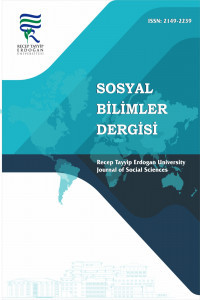GUIDED PROJECT SUPPORT EXPERIENCE OF TURKISH DEVELOPMENT AGENCIES
Development Agencies are new experience for nearly 55 – year Turkish planning adventure and socioeconomic development challenges. These foundations are also new for Turkish Institutional structure since they were founded as the result of a requirement for the adoption of EU regional development policies. Most important functions given legally to the Agencies are preparing regional development plans (RDPs) for the NUTS II regions they operate, in the close collaboration and coordination with local actors in order to utilize local potentials by putting targets for socio-economic development and conduct financial programs by giving grants to both private and public sectors. Among the financial and technical supports of the Agencies in Turkey to locals are technical support (training staff of regional institutions or NGOs), direct activity support (for the production of sectoral strategies and feasibilities for large size investments), financial support programs (call for projects) for public and private sectors, guided project support (in the coordination of the Agency itself) and credit support without interest. Among the supports the Agencies provide to their regions, perhaps guided projects are expected to affect the cities’ structures the most since they are designed together with the Agencies and local institutions like municipalities, which are directly responsible for the public services in the cities and have the capability of making important decisions about physical and social infrastructure in the cities. Guided projects have the largest budgets (up to 5 million Turkish Liras 1.7 Million Euros) among the Agencies’ supports therefore some major projects can be designed and implemented with the support and partnership of the local institutions. The aim of the present study is to give brief information about Turkish regional development policy, development agencies, their supports and finally guided projects by considering the samples implemented in different parts of the country.
GUIDED PROJECT SUPPORT EXPERIENCE OF TURKISH DEVELOPMENT AGENCIES
Development Agencies are new experience for nearly 55 – year Turkish planning adventure and socioeconomic development challenges. These foundations are also new for Turkish Institutional structure since they were founded as the result of a requirement for the adoption of EU regional development policies. Most important functions given legally to the Agencies are preparing regional development plans (RDPs) for the NUTS II regions they operate, in the close collaboration and coordination with local actors in order to utilize local potentials by putting targets for socio-economic development and conduct financial programs by giving grants to both private and public sectors. Among the financial and technical supports of the Agencies in Turkey to locals are technical support (training staff of regional institutions or NGOs), direct activity support (for the production of sectoral strategies and feasibilities for large size investments), financial support programs (call for projects) for public and private sectors, guided project support (in the coordination of the Agency itself) and credit support without interest. Among the supports the Agencies provide to their regions, perhaps guided projects are expected to affect the cities’ structures the most since they are designed together with the Agencies and local institutions like municipalities, which are directly responsible for the public services in the cities and have the capability of making important decisions about physical and social infrastructure in the cities. Guided projects have the largest budgets (up to 5 million Turkish Liras 1.7 Million Euros) among the Agencies’ supports therefore some major projects can be designed and implemented with the support and partnership of the local institutions. The aim of the present study is to give brief information about Turkish regional development policy, development agencies, their supports and finally guided projects by considering the samples implemented in different parts of the country.
___
- Amin, A. 1999. An Institutionalist Perspective on Regional Economic Development. International Journal of Urban and Regional Research, 23(2), 365–378.
- Halkier, H. 2000. Regional Policy An Inter organisational Approach. Regional and Industrial Policy Research Paper No: 37. European Policies Research Centre, University of Strathclyde, 53 sayfa. http://www.eprc.strath.ac.uk/eprc/Documents/PDF_files/R37RegPolanInter-OrganisationalApp.pdf
- Kayasü, S, Yaşar, S.S. 2006. Avrupa Birliği’ne Üyelik Sürecinde Kalkınma Politikaları: Yasal ve Kurumsal Dönüşümler. http://www.tepav.org.tr/sempozyum/2006/bildiri/bolum3/3_1_kayasu.pdf
- MARKA 2014. Güdümlü Proje Desteği ve Türkiye’deki Uygulama Örnekleri Doğu Marmara Kalkınma Ajansı Güdümlü Proje Desteği Bilgi Notu 36 sayfa
- Official Paper; Kalkınma Ajansları Proje ve Faaliyet Destekleme Yönetmeliği 8 Kasım 2008 CUMARTESİ Resmî Gazete Sayı: 27048 (Başbakanlık Devlet Planlama Teşkilatı Müsteşarlığı)
- Öztürk, A. 2009. Homojen ve Fonksiyonel Bölgelerin Tespiti ve Türkiye İçin İstatistiki Bölge Birimleri Önerisi. Planlama Uzmanlığı Tezi. DPT Uzmanlık Tezleri Yayın No: 2802. Yayın ve Temsil Dairesi Başkanlığı. Yayın ve Basım Şube Müdürlüğü Ankara. 119 sayfa.
